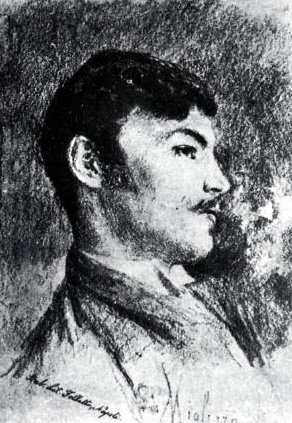Информация об исполнителе
Salvatore Di Giacomo (12 March 1860 – 4 April 1934) was an Italian poet, songwriter, playwright and fascist intellectual, one of the signers of the Manifesto of the Fascvist Intellectuals.
Di Giacomo is credited as being one of those responsible for renewing Neapolitan dialect poetry at the beginning of the 20th century. The language of Salvatore Di Giacomo is, however, not the everyday Neapolitan language of his contemporaries; it has a distinct 18th-century flavour to it, archaisms that recall the golden age of Neapolitan culture, the period between 1750-1800, when Neapolitan was the language of the best-loved form of musical entertainment in Italy, the Neapolitan comic opera, and was even the language of the Bourbon court of Naples, itself.
Di Giacomo was born in Naples.
He studied medicine briefly, largely to satisfy his father's wishes, but gave it up for the life of a poet. He then founded a literary journal, Il Fantasio, in 1880, and, like many young writers, had a varied apprenticeship, working in a print shop, as a journalist and publishing some of his early verse in the Neapolitan daily, il Mattino. He even wrote a series of youthful stories à la E.T.A. Hoffman and Edgar Allan Poe set in an imaginary German town inhabited by sinister students and mad doctors.
He had a lifelong love of libraries as well as literary and historical research, founding, in the course of his career, the Lucchese section of the National library in Naples and holding the position of assistant librarian at the library of the San Pietro a Maiella music conservatory. He was, with Benedetto Croce, one of the founders of the literary journal, Napoli Nobilissima. He received a critical boost in 1903 when Croce published a defense of dialect poetry. Di Giacomo published no anthology of his own collected poems until 1907, when he was 47 years old.
Di Giacomo's plays, such as A San Francesco and Assunta Spina, are bitter stories about turn-of-the-century life in the Naples of the Risanamento (the massive, decades-long urban renewal of the city that displaced tens of thousands of persons), workers whose health is ruined by their labors, prostitution, betrayal, prison, crime, etc. As a song lyricist, he wrote easily and abundantly for the famous Neapolitan song festival of Piedigrotta, a fact that still leads some critics to dismiss him as a lightweight.
Di Giacomo seemingly viewed standard language as necessary for modern commerce and politics, but almost by definition devoid of the life that people bring to the language they speak, the vernacular turn of phrase that exists only at a particular place in a particular time for a particular people. He closed his own essay on Neapolitan dialect poetry, written in 1900, with this passionate quote from Dante: "With the gifts God gives us from Heaven, we shall try to renew the language of the common people."
Di Giacomo is credited as being one of those responsible for renewing Neapolitan dialect poetry at the beginning of the 20th century. The language of Salvatore Di Giacomo is, however, not the everyday Neapolitan language of his contemporaries; it has a distinct 18th-century flavour to it, archaisms that recall the golden age of Neapolitan culture, the period between 1750-1800, when Neapolitan was the language of the best-loved form of musical entertainment in Italy, the Neapolitan comic opera, and was even the language of the Bourbon court of Naples, itself.
Di Giacomo was born in Naples.
He studied medicine briefly, largely to satisfy his father's wishes, but gave it up for the life of a poet. He then founded a literary journal, Il Fantasio, in 1880, and, like many young writers, had a varied apprenticeship, working in a print shop, as a journalist and publishing some of his early verse in the Neapolitan daily, il Mattino. He even wrote a series of youthful stories à la E.T.A. Hoffman and Edgar Allan Poe set in an imaginary German town inhabited by sinister students and mad doctors.
He had a lifelong love of libraries as well as literary and historical research, founding, in the course of his career, the Lucchese section of the National library in Naples and holding the position of assistant librarian at the library of the San Pietro a Maiella music conservatory. He was, with Benedetto Croce, one of the founders of the literary journal, Napoli Nobilissima. He received a critical boost in 1903 when Croce published a defense of dialect poetry. Di Giacomo published no anthology of his own collected poems until 1907, when he was 47 years old.
Di Giacomo's plays, such as A San Francesco and Assunta Spina, are bitter stories about turn-of-the-century life in the Naples of the Risanamento (the massive, decades-long urban renewal of the city that displaced tens of thousands of persons), workers whose health is ruined by their labors, prostitution, betrayal, prison, crime, etc. As a song lyricist, he wrote easily and abundantly for the famous Neapolitan song festival of Piedigrotta, a fact that still leads some critics to dismiss him as a lightweight.
Di Giacomo seemingly viewed standard language as necessary for modern commerce and politics, but almost by definition devoid of the life that people bring to the language they speak, the vernacular turn of phrase that exists only at a particular place in a particular time for a particular people. He closed his own essay on Neapolitan dialect poetry, written in 1900, with this passionate quote from Dante: "With the gifts God gives us from Heaven, we shall try to renew the language of the common people."
показывать / спрятать больше






